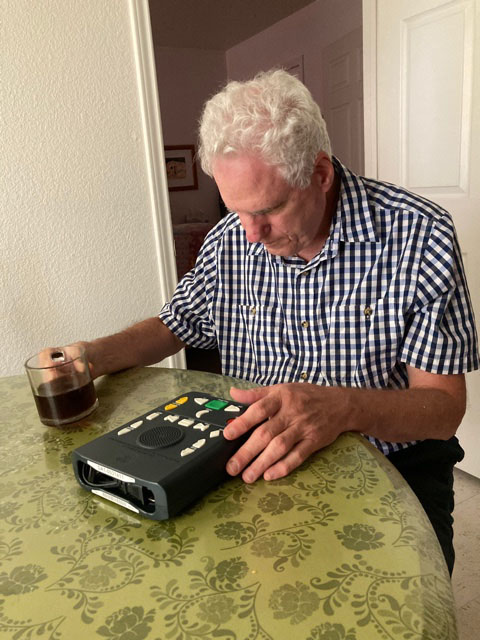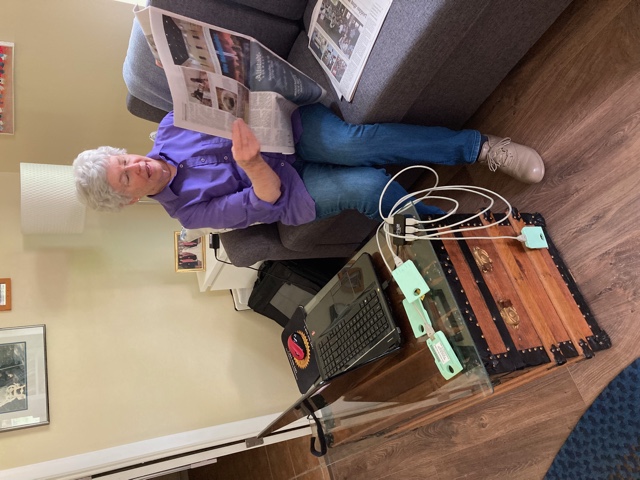
Listening to the week’s local news, Duncan Holmes is both a board member and client of Hill Country Recording for the Handicapped.
Sept 15, 2021–One of our forgotten pleasures is being read to. That was how we were all introduced to the world of words. This continued even after we learned to read silently to ourselves. I still remember my 6th grade teacher reading I, Juan de Pareja to our class after recess.
For the vision impaired, “being read to” is more than a pleasure; it becomes a quality of life issue. Imagine trying to get all the local news when you can’t read the newspaper.
There are volunteers in town who have been filling that need since 1988. They make up Hill Country Recording for the Handicapped, and I’ve been curious about this group for years. I finally tracked down the president of the board, John Akin, and asked him to describe what they do.
“We read the newspaper for those who can’t,” he said modestly. “It’s not a hard thing to do.”
Here’s how it works. The dozen volunteer readers each choose a month. They pick up each week’s edition of the Fredericksburg Standard during that month and record it onto a computer app.
While maintaining it’s not hard to do, Akin admits the first time took him six hours.
“I was trying to make it perfect,” he said. “Now, when I make a mistake, I just apologize and move on.”
He has whittled the prep and recording time to under two hours, and out of that comes 20 to 30 minutes of actual recorded reading time.
As to which articles they choose to read, well, that is up to each reader. All of them try to include everything on the front page, and any national, state, or local news inside. News from Doss and Harper is popular, as are updates from local groups such as the Golden Hub. Columns, commentaries, and most Letters To The Editor make the cut. And listeners are big on hearing the obituaries.
Akin also takes a moment to describe photos if they are pertinent or of interest.
Whoever is doing the reading, Duncan Holmes–who is a client as well as long-time board member–has been more than satisfied with the product. (Note: Duncan’s Letter to the Editor commenting how much he enjoyed hearing the Full House column being read aloud is one of the reasons I looked into this in the first place!)
“It means a lot to me,” Holmes said. “It gives me some idea of the things going on in this community. I look forward to it every week.”

Gail Anderson, a volunteer for Hill Country Recording for the Handicapped, reads the week’s news into the recording app that will be duplicated and shared with the vision-impaired in the community.
Holmes and Akin give credit to Valerie Dorer as the pioneer who started the program. While she doesn’t know the exact year, Dorer does remember working with Quinn Farabee, a retired engineer who moved to Fredericksburg in the 1970s and gradually lost his vision. She began reading for him, then more community members became involved. Peggy Hartwein and others stepped up and helped organize the group into a non-profit, and it has been serving local vision-impaired folks ever since.
As is normal behavior for us humans, we don’t always pay attention to community services until we need them, whether it is Meals on Wheels, Habitat for Humanity, or Hill Country Recording for the Handicapped.
But to know an organization like this exists, quietly fulfilling its mission and doing the work for those who need someone to read to them, somehow makes me feel even better about living here.
Details:
The services of Hill Country Recording for the Handicapped are available to anyone who is visually handicapped or who cannot read normal print for any reason. For information or to refer someone, contact the Hill Country Community Needs Council at 830-997-9756.